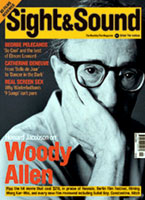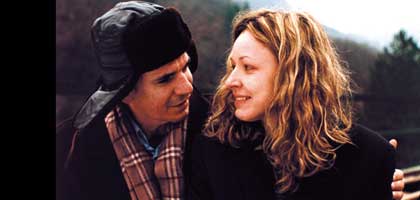
Life Is a Miracle
France/Serbia and Montenegro 2004

Reviewed by Julian Graffy
Synopsis
Our synopses give away the plot in full, including surprise twists.
Rural Bosnia, 1992. Luka (Slavko Stimac), a Serbian engineer, has moved his family from Belgrade in order to build a railway line through the mountains between Bosnia and Serbia and develop tourism. Both his opera-singer wife Jadranka (Vesna Trivalic) and his football-mad teenage son Milos (Vuk Kostic) are frustrated by the thwarting of their own careers. While Luka tries to keep in with the local mayor and Party officials and Jadranka worries that she is going mad, Milos scores a dream goal in a match watched by a scout for Partizan Belgrade.
Celebrations mark the cutting through of another tunnel and the locals go on a bear hunt, unaware of the worsening political situation. The family comes to terms with reality when Milos simultaneously receives an offer from Partizan and his army call-up papers. At a party held for him before he leaves, Luka's officer friend Captain Aleksic (Stribor Kusturica) assures him that Milos will be kept out of danger, but a distraught Jadranka runs off with a lascivious Hungarian musician. When Milos also leaves Luka is left alone in a war zone.
Milos is taken prisoner by the Bosnians but a young Muslim nurse, Sabaha (Natasa Solak), is captured by the Serbs and Luka is told to guard her so that she can be exchanged for his son. After initial animosity and mistrust, Luka and Sabaha fall in love. When the Muslims advance they flee with other local Serbs and hide in the remote house where he was born.
Tired of her Hungarian, Jadranka returns to her husband, only to discover Sabaha, who runs away and attempts suicide on the railway tracks. Luka saves her and tells her that they will go to Australia. Captain Aleksic reports that the girl is on the UNPROFOR list for exchange, but Luka refuses to give her up. As they try to cross the River Drina into Serbia, Sabaha is shot by a Bosnian sniper. Luka gets her to a doctor and saves her life but cannot prevent her from being included in the exchange. Though his wife and son are now restored to him, Luka is desperate at the loss of Sabaha. He runs off and tries to throw himself under a train. In a final dream sequence he and Sabaha ride off together on the donkey that has followed him throughout his adventures.
Review
There is enough inventiveness in Emir Kusturica's new film to keep another director in plots for a decade. Tracing the entanglements that befall Bosnia-based Serbian engineer Luka and his family after the outbreak of war in 1992, Life Is a Miracle is a comic celebration of Balkan joie de vivre and the beauty of the Bosnian countryside (80 per cent of the film is shot outdoors, through the changing seasons); a story of one man's obsessive dream and the havoc that it wreaks on those around him; a forceful and ironic polemic against conventional readings of the politics of the break-up of Yugoslavia; and a tragic tale of impossible love which makes explicit allusion to Shakespeare.
Perhaps the most extraordinary manifestation of the energy and confidence driving the film is its deployment of a cast of performing animals. Life Is a Miracle contains sheep and hens, ducks and geese, a horse that enters the hero's living room, a dog that flies through the window of a moving car and a cat that shares one character's breakfast and mesmerises a pigeon to death. It has a hawk and wild bears which kill a local peasant and somehow toss his body into a tree. Above all it has a lovelorn female donkey, Milica, who is present in both the first and the last scenes of the film. The first time we see her she is standing tearfully across the track, waiting for a train to knock her down. Dissuaded from this Liebestod she attaches herself to Luka, and at the end saves him from an identical fate.
The comic affection with which Kusturica treats his animal participants extends to the human cast and the film is full of vivid portraits, from Luka's sad, crazed, opera-singer wife Jadranka, worried about the effect the dust of excavation is having on her throat and comparing herself to Anna Karenina, to a host of memorable minor figures, including chess-playing postman Veljo, constant purveyor of bad news, a thuggish and gluttonous mayor, Radovan, and the odious Filipovic, blown up while boasting of his prowess as "the Serbian stallion". The sympathetically drawn Captain Aleksic, a role in which Kusturica cast his son Stribor, explains to Luka that in wartime all personal agendas are cast aside, while valiantly continuing to protect him and his new-found love. Most interesting and complex of all is the idealistic Luka, whose dream is overtaken by history and whose sudden, poleaxing love for his captive Sabaha complicates his attempts to save his beloved son Milos.
Life Is a Miracle tries to show the effect of war on the lives of ordinary, apolitical people and, specifically and not for the first time, to redeem Serbs from the demonised status they acquired in western public opinion during the break-up of Yugoslavia. There will certainly be those who object to the glancing and ironical way in which the Bosnian war is represented in the film, but few will resist the mocking portrait of an American woman TV reporter. Ignorant, superficial and crass, she completely misunderstands the true implications of the prisoner exchange in one of the film's best tragic-comic sequences.
Audiences have long known that Kusturica can do big set-piece scenes and there are several here, including a bear-hunt over the rolling hills that ends in terrified flight, a number of concerts and parties (perhaps the most expendable scenes in the film) and an extraordinary football match, played in a swirling Bosnian mist, at which Jadranka quotes Shakespeare and everything ends in chaos and riot. But Life Is a Miracle also contains passages of quiet tenderness, such as the sequence in which father and son are fleetingly reunited but too exhausted to communicate, or the scenes by the Drina in which Luka and Sabaha dream of building railroads in Australia. There is a satisfying subtlety about the gradual accretion of metaphorical implication around the railway track and its tunnels, one of which conceals the invisible but lethal border between Bosnia and Serbia.
Luka and Milos have a recurrent conversation, ostensibly about football, on the relative importance of speed and feeling, concluding that what is needed is a mix of the two. Life Is a Miracle has both in abundance.
